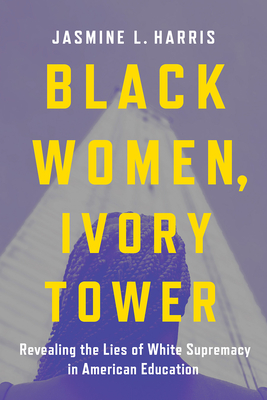Book Review: Black Women, Ivory Tower: Revealing the Lies of White Supremacy in American Education
Reviewed by:
Ahmad WrightThe best colleges and universities in the nation promise a sense of belonging, public validation, and personal relationships that can last a lifetime. At least that is what is presented in the fine print of the acceptance letter and during the college tour. In Black Women, Ivory Tower: Revealing the Lies of White Supremacy in American Education by Jasmine L. Harris, the best education money can buy comes with strings attached as invasive and penetrating as steel cables in concrete. They are ties that manifest themselves as hurdles, walls, vacuums, and broken boundaries that can wear on the Black college student on a predominantly white elite college campus. The proverbial mask spoken so many years ago by Paul Laurence Dunbar and W. E. B. Du Bois as the second covering Black people in particular wear to disguise and protect true emotions in isolated white spaces becomes a full suit of armor as Harris outlines the plight of not belonging on campuses she dubs “Historically White-Serving Colleges and Universities (HWSCUs)—schools with the highest degree value post-graduation”—places of intellectual disenfranchisement, racism, sexism, and, in some cases, sexual assault.
At once, the book is not only a testament and warning to prospective Black female college students entering white elite colleges, but it presents itself as a historical framework from which Black female professionals, past and present, recall their silent outrage and former status as an outsider to their alma mater, their peers, and college community—and how they fought to exist during their time of matriculation.
Dr. Jasmine L. Harris is currently associate professor of African American Studies and coordinator of the African American Studies Program in the Department of Race, Ethnicity, Gender, and Sexuality Studies at the University of Texas, San Antonio. She is a graduate of Vassar College and Syracuse University. She completed her PhD at the University of Minnesota in 2013. Vassar College, the author’s alma mater, is the most immediate recipient of ire in the text as the springboard to the greater experience of Black women in elite college spaces. The book opens on a battleground moment where the author listens to a freshman peer talk about her family ties to Vassar, thereby proclaiming intentionally or not, her status as a legacy. Meanwhile, the author—a standout student since kindergarten—had always felt her intelligence marginalized, her speech quieted, and, in a sense, her brilliance dimmed. We read of Vassar’s original sins, the shaming of Anita Hemmings, in 1897, a presumed descendant of Sally Hemings, who passed for white to attend the school until she was outed by her roommate. Ellen Love, her daughter, would suffer the same fate in 1923.
This real disconnect between legacy culture at HWSCUs and first-year Black students is described as a common occurrence with research to support. There are students who have few points of connection to the social ties to the school and feel they must wear their academic accomplishments on their sleeve to constantly prove they belong as a worthy admitted student, not to mention, as a collective minority. Harris details instances where her identity as a college student must be proven. This refrain, to prove one’s belonging, repeats itself throughout the text: Black female MDs who do not “seem enough like a doctor” to tend to a life in crisis on an airplane; the author herself was stopped by campus security and not recognized as student or professor; and fellow academics and administrators who routinely question her credentials in multiple levels of academia.
What ties these personal and collective experiences are the strong historical references. The chapters and subtitles in this regard present a tapestry and context behind the history and formation of the first schools for African Americans. For example, in Chapter 3, “The Disappearance of Black Teachers,” demonstrates the irony of separate but equal in terms of the role of Black teachers and administrators play. While the book explains an educational system that was never intended for African Americans, at the same time it highlights academic outliers, such as the Daytona Literacy and Industrial Training School for Negro Girls founded in 1904; it would later merge with the Cookman Institute to become Bethune-Cookman University, the first HBCU in Florida. Also mentioned is the historic Preparatory High School for Colored Youth that was established in 1870 in Washington, D.C. It was renamed as Paul Laurence Dunbar High School in 1916, becoming the “first nonwhite high school in the United States,” a former powerhouse fueled by caring Black teachers.
Harris reveals the origins and places of HBCUs where Blacks have excelled in higher education despite structures of white supremacy. The later chapters take a personal turn as Harris speaks on the ultimate landmine of being a student in an all-white space. Fetishization by white males, sexual assault, and lack of white female allies or support from administration are discussed as major barriers. In the pre-#MeToo era of keep it quiet and move on, the book dedicates tough flashbacks from the author’s past coupled with statistics of sexual assault on college campuses. In “Benediction,” Chapter 8, the last, there is real pain here exposed as an open wound borne of her matriculation as a college student, microaggressions thereafter, and the will and strength to keep it all together to exist in a self-defined space.
By the end of Black Women, Ivory Tower—all 185 pages and ten pages of Notes—every parent of an Ivy League-bound Black girl; every Black student bound for a predominantly white academic space; every high school counselor of a Black girl enrolled in a HWSCU; every college professor, college administration team from the security guard to the president will have to ask themselves where they stand in terms of supporting Black students, educators, and administrators in spaces that can be isolating and unwelcoming on various levels.

